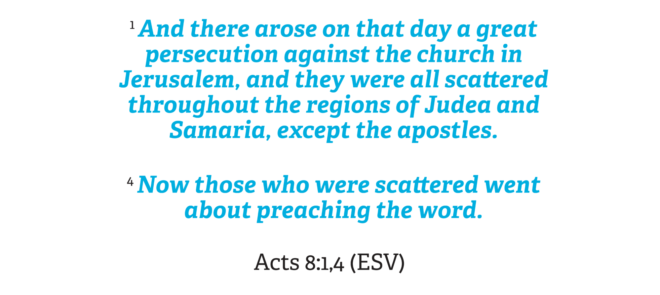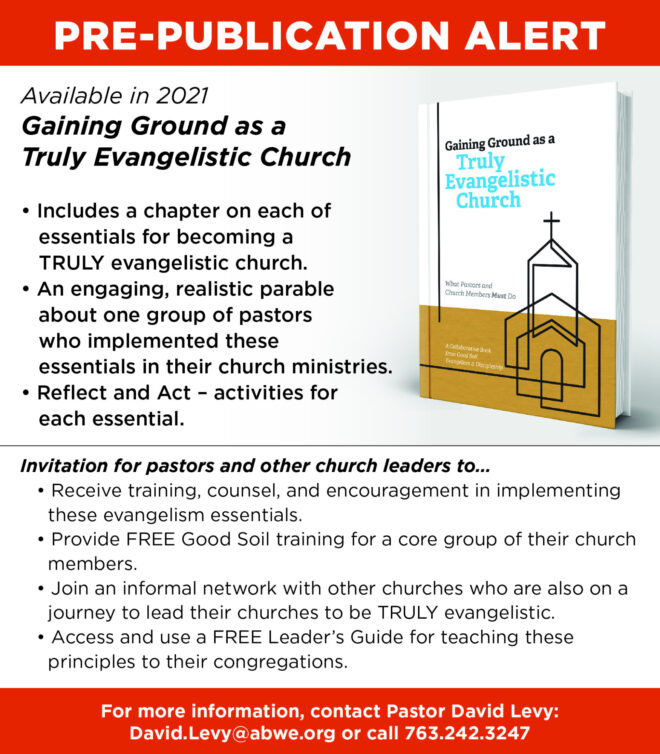THE Mission: Making the Great Commission THE Mission of Your Church 3rd Essential for a TRULY Evangelistic Church

A local church’s mission must TRULY be the Great Commission. Just using the “Great Commission” as a pious platitude is not enough.
If a church ministry researcher, an objective outsider, visited every service and activity of your church for one month, what would he or she report is the TRUE mission of your church?
In the business world, “secret shoppers” (also called “mystery shoppers”) are hired to give objective professional feedback on how a store is REALLY doing. What kind of review would your church get if a Great Commission secret shopper “shopped” at your church?
Virtually every evangelical church states somewhere in an official church document that it exists to carry out the “Great Commission.” But a 2018 Barna survey found that 51% of U.S. churchgoers said they were not familiar with this term. Another 25% indicated they had heard the term but could not recall its exact meaning. And only 37% could pick Matthew 28:18-20 out of a “line up” among four other unrelated Bible passages as being a Great Commission text.

Do you really and truly want to know whether or not your church is a Great Commission church? If that is important to you, ask yourself the following five questions and be brutally honest with your answers. And, if you are a pastor, guide your church leaders in a frank discussion based on these questions:
First—Is your church actively “going” in the way Jesus intended in His commission?

So, what does “Go” mean? It is true that in the Greek text of the New Testament, the word “Go” is not the verb (command) in the sentence, in fact it’s not a verb at all. The English word “Go” is actually translated from a Greek participle (literally, “having gone”) that assumes followers of Jesus will be going—it assumes evangelistic movement on our part.
As simple as the Great Commission appears to be, a lot of Christians have spent far too much time and ink trying to understand and explain it—often with the result of confusing and misinterpreting its simple meaning. Years ago, someone told me, “The way to understand the meaning of the Great Commission is to read the Book of Acts and see how the early church understood it.” Try that, if you have doubts about the meaning and seriousness of our Lord’s commission. For example:

But what should “Go” mean today, in your church and mine? How are we to contextualize obedience to the Great Commission in our congregations, at the local level. Well, that’s a big part of what this series of articles is about, so I don’t want to say too much too soon. But here are a few starter thoughts. If your church is “Going,” in the Great Commission sense …
- A high percentage of your church members will be practicing evangelism as a regular lifestyle. And I don’t mean just being non-verbal witnesses. They will be talking to unbelievers about Jesus and how He can give them eternal hope and bring joy into their lives.
- Seeker-unbelievers and newly re-born folks will be showing up in your church services frequently, instead of rarely.
- Your church will be thinking “outwardly,” as much or more than “inwardly.” Church members will be looking for opportunities to bring their unsaved friends to church and any of its seeker-friendly activities.
Second—Is your church making disciples?

The command in Matthew’s account of the Great Commission is “make disciples.” As you probably know, the New Testament word “disciple” is simply a learner or an adherent to the teachings of a religious leader.
In much of western Christianity today, the word “discipleship” has become very popular, much more popular than the word “evangelism.” That's probably because “evangelism” and “conversion” and “saved” and “born-again” are not politically correct in our pluralistic societies, but “discipleship” has not yet been black-listed by liberal politicians, media, and religious leaders. And discipleship with other Christians is not as intimidating as telling an unbeliever his or her worldview is wrong and there are serious eternal consequences for not putting complete trust in Jesus Christ--the "one and only Way" to receive eternal life.
Discipleship, in many evangelical churches today, means one of two things: (1) doing one-on-one spiritual mentoring with an immature believer, or (2) small group Christian Bible studies focused on issues related to spiritual growth.
Please do not misunderstand me—those ARE good and important ministries. But that is not the core command of the Great Commission.
To understand the meaning of “make disciples,” look at the two participles that follow the command to disciplize. The first is “baptizing.” What precedes baptizing? Conversion!
Another way to understand the meaning of "make disciples" in Matthew's account of the Great Commission is to compare it with the accounts given by Mark and Luke:


When Jesus commanded us to make disciples, He meant for us to do our human part in making followers of Jesus—followers who followed because they believed in Him, had turned from their previous religious beliefs and practices, and simultaneously put their trust in Him. In other words, He meant for us to begin by evangelizing.
To focus on discipleship, in the all-too-often modern sense, without prioritizing evangelism is not a Biblically balanced response to the Great Commission.
After all, where are your potential “disciples” if your church is not actively engaged in bringing sinners to faith in Jesus?
Third—Is your church an “all nations” kind of evangelistic church?

When we read Matthew 28:18-20, our tendency is to think of “nations” as “countries.” But the New Testament word for nations (ethne) means “people groups,” not political entities with geographical boundaries.
Yes, there is the “to the end of the earth” scope of the Great Commission, as Jesus indicated in Acts 1:8. That’s foreign missions, a vital part of the command that every TRULY evangelistic church will be involved in obeying.

But, even in North America, there are “nations” all around most of our churches—people groups with skin colors, languages, customs, and social connections that are very different from most of the members of our congregations. The topic is too big to get into in this article, but John Piper’s Let the Nations Be Glad informs us that “all the nations” outreach can and should be local, as well as global.
Is your church reaching and assimilating members of local people groups who do not typically identify with the ethnic demography of your congregation’s core membership?
Fourth—Do the professions of faith that happen through your church’s ministry result in baptisms?

I know of churches that practice a style of evangelism that results in lots of “decisions,” but few baptisms. There is something seriously wrong if people who profess faith in Jesus are not willing to identify with Christ and His Church by baptism. And there is something wrong with churches if their approaches to evangelism are resulting in many profess-ers, but few disciples.
One key indicator of a TRULY evangelistic church is a regular occurrence of new believers who are identifying publicly, through baptism, as sincere followers of Jesus Christ. Yes, it is a wonderful thing to watch the children of your church’s families profess their faith in Jesus and follow Him in baptism. But if those are the only baptisms happening in your church, it is probably a sign that your church is inwardly focused, not TRULY evangelistic in the Great Commission sense.
Fifth—Is your church a Great Commission “Teaching” Church?

Here’s where what many Christians now think of as “discipleship” comes in. Just as a church cannot claim to be a Great Commission church without evangelism, which results in baptisms, it can’t claim to be a Great Commission church without teaching that matures its disciples to be strong and healthy disciples who make other disciples.
To be accurate in interpreting Matthew 28:18-20, we need to ask, “Teaching whom?” In this context, Jesus was specifically telling us to teach those whom we have reached, who have been converted (from among a variety of available people groups) to be genuine faith-based Christ followers, who have been baptized.
For many churches, teaching is simply stuffing more Bible knowledge into heads of pew-sitters who already know a lot but do little to practice what they know. Great Commission teaching, as Jesus intended, is more about grounding new believers in the Word of God, so they can effectively obey the same commission that brought them to Jesus, as His disciples.
With all of this mind, what would a “secret shopper” say about your church?
Here’s a look back and a look forward to the entire set of articles in this “Twelve Essentials to a TRULY Evangelistic Church” series:
- The Twelve Essentials Overview
- The Evangelistic Pastor
- The E-Team
- THE Mission
- Local Focus
- Congregational Warmth
- Equipped Congregation
- Basic Discipleship
- Peer Accountability
- Evangelistic Praying
- Shared Rejoicing
- Strategic Simplicity
- Relentless Pursuit





